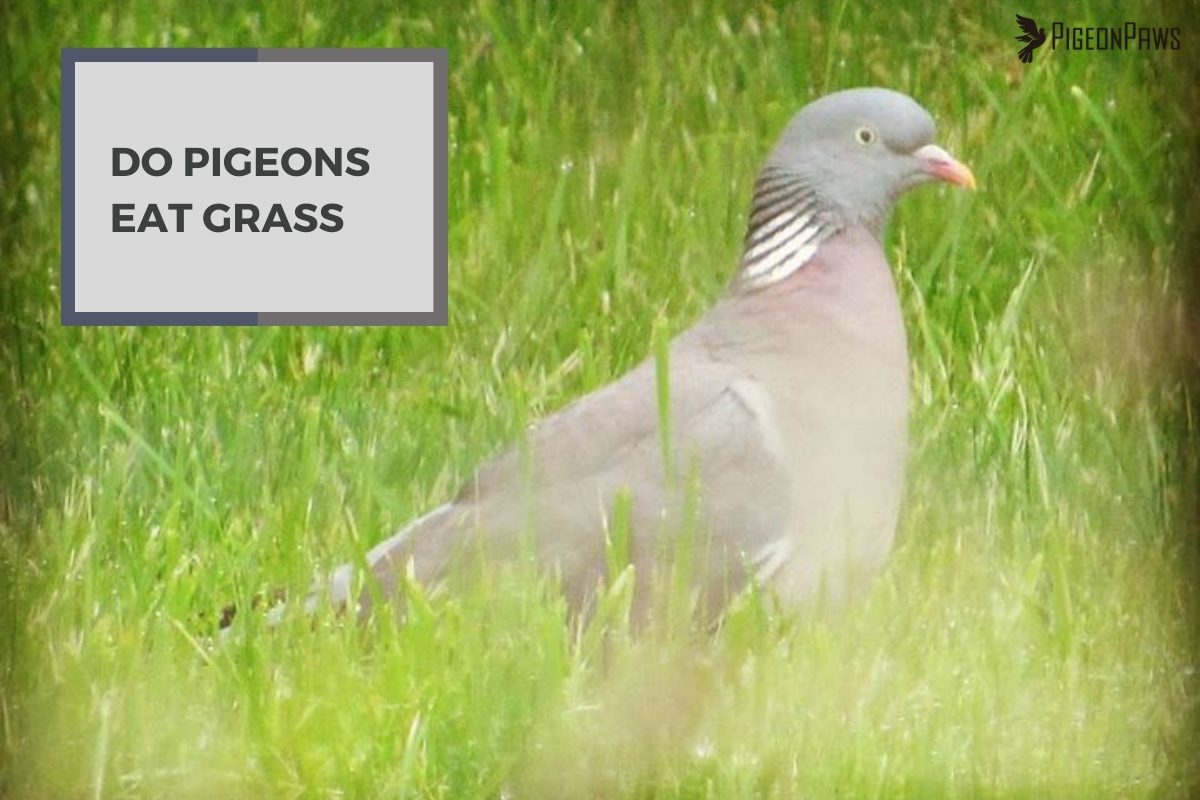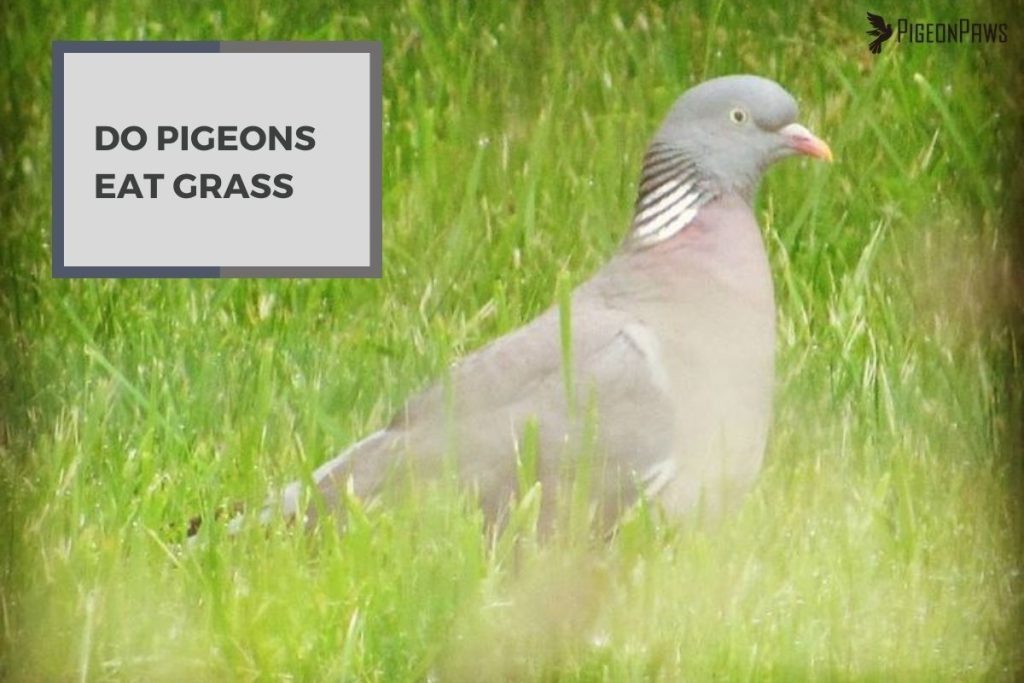Do Pigeons Eat Grass? The Truth About What Pigeons Really Eat!

Have you ever noticed pigeons pecking at your lawn or garden? Have you ever wondered if they eat grass or if it’s just a random behavior? You’re not alone! Many people are curious about pigeons and their diet.
Pigeons are not able to digest grass, which means that they cannot eat it as a source of nutrition. However, they may still be attracted to pecking at lawns or gardens, which can be damaging to the grass and harmful to the pigeons.
In this article, I’ll explore why pigeons can’t eat grass, why they peck at lawns, and the benefits and risks of feeding them grass seeds. I’ll also provide tips on safely feeding pigeons grass seeds and preventing them from eating your grass seed. So, read on to learn more!

What Is The Reason Behind Pigeons Not Being Able to Consume Grass?
If you’ve ever seen a pigeon pecking at grass, you might think the grass is a part of their diet. However, this is not the case. Pigeons are unable to digest grass due to their unique digestive system.
Pigeons lack teeth, which means they have to swallow their food whole. Once inside their body, the food is broken down by a two-chambered stomach.
However, this digestive system is designed to break down seeds, grains, and small insects, not grass. It is difficult to break down, and the fibrous material can cause blockages in a pigeon’s digestive tract.
Furthermore, grass does not provide pigeons with the necessary nutrients for their health. It lacks the essential amino acids, vitamins, and minerals pigeons need to thrive. Eating grass can actually be harmful to pigeons, causing them to feel full without providing the necessary nutrients for their bodies.
If Not Grass, Can Pigeons Eat Grass Seeds?
Pigeons can eat grass seeds. Grass seeds are a common part of the natural diet of pigeons and are generally safe for them to consume. Pigeons have a diverse diet that includes a variety of seeds, grains, fruits, and vegetation, and grass seeds can be a nutritious component of their overall diet.
Grass seeds can provide pigeons with essential nutrients such as carbohydrates, proteins, and fats. They can be a valuable source of energy for these birds. However, it’s important to note that grass seeds should not be pigeons’ sole or excessive food source.
While grass seeds can be included in their diet, it’s essential to ensure that the seeds are clean and free from any chemicals, pesticides, or contaminants. Feeding pigeons grass seeds from a safe and reliable source is crucial to maintain their health and well-being.
Also remember that these birds have a preference for certain types of seeds, and individual pigeons may have their own preferences as well. Offering a variety of seeds and grains in addition to grass seeds can help provide a balanced diet and meet their nutritional needs.
What Are The Benefits of Feeding Grass Seeds to Pigeons?
Although it is a fact that pigeons do not consume blades of grass, they demonstrate a tendency to feed on its seeds, which can serve as a wholesome supplement to their diet and provide multiple advantages.
Source of Nutrients
Grass seeds contain essential amino acids, vitamins, and minerals necessary for a pigeon’s health. These nutrients can help maintain a pigeon’s immune system, promote healthy feather growth, and support their overall well-being.
Variety in Diet
Introducing grass seeds as a dietary supplement for pigeons can effectively introduce diversity to their nutritional intake. This can mitigate the likelihood of a pigeon developing culinary monotony, encouraging a proclivity towards healthy eating habits.
Behavioral Enrichment
Feeding grass seeds to pigeons can provide behavioral enrichment. They are intelligent creatures that require mental stimulation to prevent boredom and encourage natural behaviors. Foraging for food is a natural behavior for pigeons, and feeding them grass seeds can allow them to engage in this behavior.
How Should You Feed Grass Seeds to Pigeons?
Feeding grass seeds to pigeons can provide several benefits, but it’s essential to do it correctly to ensure the birds’ health and safety. Here are some tips on how to properly feed grass seeds to pigeons:
Seed Quality
When selecting grass seeds to feed pigeons, choosing high-quality seeds is essential. Ensure the seeds are clean, free from dirt or debris, and have not been treated with chemicals or pesticides.
Feeder Placement
Placing the grass seed feeder off the ground is best to prevent contamination from droppings and other debris. A hanging feeder or elevated platform is ideal for feeding grass seeds to pigeons.
Fresh Water
To sustain their digestive and hydration needs, it is imperative to ensure that a constant supply of fresh water is readily available for the avian species Columba livia domestica, commonly known as pigeons.
The provision of clean and unpolluted water is pivotal for maintaining the overall health of these avifauna creatures.
Are There Any Risks Involved in Feeding Pigeons Grass Seeds?
Although grass seeds offer numerous advantages to pigeons, feeding them also comes with certain risks. It is crucial to consider the potential hazards associated with this practice.
The following are some of the potential dangers that should be taken into account:
Obesity
Overindulgence in grass seeds can lead to obesity in pigeons, thus putting them at risk of various health concerns, including cardiovascular disease, diminished joint function, and decreased life expectancy.
Digestive Issues
Excessive consumption of grass seeds may result in digestive complications for pigeons, as the seeds’ substantial fiber content can lead to gastrointestinal disturbances and diarrhea.
Contamination
Providing grass seeds to ground-dwelling pigeons may escalate the chances of contamination via fecal matter and extraneous matter. Such contamination can potentially propagate disease and infections among the avian populace.
How to Stop Pigeons Eating Your Grass Seed?
If you’re a gardener or a lawn enthusiast, you’ve probably had the experience of pigeons eating your grass seed. Here are some suggestions to help keep pigeons off your lawn:
Netting
One effective way to prevent pigeons from eating your grass seed is to cover the area with netting. This can be done by stretching the netting over the area or using stakes to secure it. The netting will prevent the pigeons from accessing the seed and allow it to grow undisturbed.
Scare Tactics
Pigeons are easily frightened by loud noises, sudden movements, and shiny objects. You can use scare tactics such as hanging reflective tape or using a motion-activated sprinkler to deter them from your lawn.
Alternative Feeding
Consider providing pigeons with an alternative food source if you have a bird feeder in your yard. This can divert their attention away from your grass seed and prevent them from causing damage to your lawn.
Repellents
Multiple avian deterrents are currently accessible in the market, consisting of both sprays and adhesive gels. These items are composed of compounds that elicit an unpleasant response in pigeons and can effectively discourage them from consuming your valuable grass seed.
Cheap and Quick Way to Stop Bird from Eating Grass Seed
Conclusion
Although pigeons are known to peck at lawns, it is worth noting that they do not consume grass blades. This is because their digestive system cannot break down these plant structures. Despite this, pigeons derive nourishment from feeding on grass seeds, which have conferred various health benefits to these birds.
If you decide to feed grass seeds to pigeons, it’s essential to do so in moderation and take precautions to prevent potential risks such as obesity, digestive issues, and contamination.
Additionally, you can use netting, scare tactics, alternative feeding, or repellents to keep pigeons from eating your grass seed. By following these guidelines, you can help maintain a healthy balance between pigeons and your lawn while ensuring the best possible outcomes for both.

